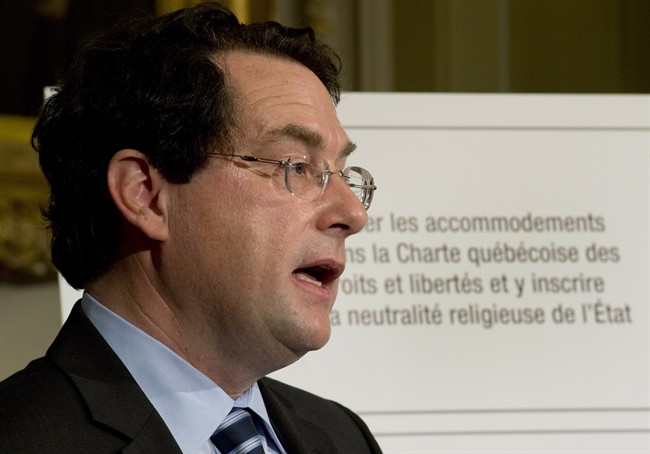QUEBEC CITY – The hearings into Quebec’s proposed charter of values heard from a constitutional expert, a former Supreme Court judge and the rector of the Université de Montréal on Friday.

Constitutional expert Henri Brun predicted on Friday that there will be major judicial wars if Bill 60 is adopted.
“There will be ten years of storm,” Brun told the parliamentary committee in charge of studying the Parti Quebecois’ proposed secular charter.
Brun, however, does not want the bill to be dropped.
On the contrary, he and a group of pro-charter lawyers calling themselves Juristes pour la laïcité et la neutralité religieuse de l’État argued that Bill 60 is very much needed, adding it is “valid and constitutional.”
“Quebec’s secular character has been recognized in various Supreme Court decisions, but there remains a legislative vacuum regarding the modalities of the obligation for Quebec to be a neutral state,” said Brun.
Former Supreme Court judge Claire L’Heureux-Dubé said that the Quebec government was in a “perfectly legitimate” position to use the notwithstanding clause to enact the charter should it be found to contravene the Canadian Charter of Rights.
“Faith is an internal matter,” she argued.
“It isn’t a fundamental right; it’s considered a civil liberty and it isn’t absolute,” she said before asking the rhetorical question: “What is more discriminatory, religion or a secular charter?”
L’Heureux-Dubé was asked to comment an opinion piece penned by her former Supreme Court colleague Louise Arbour.
The former judge and United Nations High Commissioner wrote in La Presse on Friday that the PQ’s proposed charter placed a “particularly odious” burden on Muslim women.
“Let us remember how easy it is to restrict the freedom of others, especially when this initiative comes at no cost to those who advocate it,” Arbour wrote.
“The state has the burden to prove that an infringement of a fundamental freedom such as the freedom of religion is justified. Nothing indicates that this is the case in this proposed charter.”
She also reminded Quebecers of the history of discrimination that has taken decades to remedy.
“And those who want to rely on our history to claim that this is about state neutrality rather than discrimination should remember that it took the intervention of the Supreme Court to remedy the injustices that the government of Maurice Duplessis inflicted on Jehovah’s Witnesses and Communists.”
Université de Montréal speaks up
The National Assembly committee also heard from one of Montreal’s largest employers.
Université de Montréal Rector Guy Breton said the institution employs 10,000 people and has never once fielded a grievance about religious signs.
“We deal with accommodations on a case-by-case basis and it works well,” said Breton.
“We have mechanisms in place to deal with that.”
Breton clashed with the minister responsible for the charter, Bernard Drainville, when he said: “We want more diversity on our campus, not less.”
Drainville responded that it was unfair of Breton to claim the charter would quell diversity.
“That is a false premise,” he said.
“I’m frankly astonished at your extrapolation and interpretation of the charter.”
Breton concluded by saying the secular charter would hurt recruitment at the university.


Comments